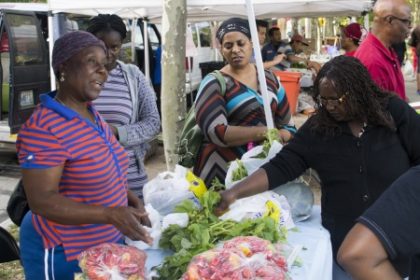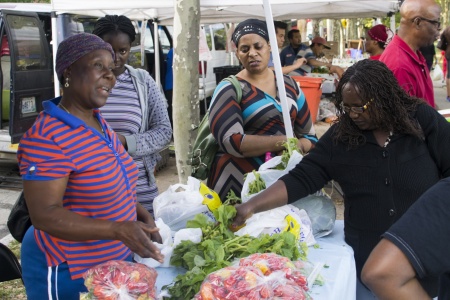
 Julius Kolawole has a plan to “bring the ocean to the desert.” Or at least the fish.
Julius Kolawole has a plan to “bring the ocean to the desert.” Or at least the fish.
The desert, in this case, is a “food desert,” places defined by the USDA as “urban neighborhoods and rural towns without ready access to fresh, healthy, and affordable food” which “have no food access or are served only by fast food restaurants and convenience stores that offer few healthy, affordable food options.” Fresh, nutritious food is particularly hard to come by in these locales, which are often low-income areas, because “food outlets” tend to go where the money is. One such neighborhood is in the southern end of Providence, capital of the “Ocean State,” Rhode Island. That’s where Julius Kolawole and the African Alliance of Rhode Island (AARI) are at work to bring fresher, local food to residents.
AARI, established in 2004, focuses on improving the health and economic status of refugees and immigrants from the African continent. Today, AARI’s constituents include individuals from 40 African countries and newcomers from all parts of the world. Governed by an 11-member volunteer Board of Directors, the group’s work is carried out primarily by dedicated volunteers and consultants engaged for special projects.
“We began a community garden project in 2009,” says Kolawole, president of AARI. “Africans have lived in Rhode Island for many years, and there were no African community gardens. Africans, in general, have knowledge of agriculture. But if they were going to be able to practice the skills they know, they needed a place to garden. AARI was able to lease an empty lot from West Elmwood Housing where 14 refugees built raised beds. You have to build raised beds in the city because the soil is considered contaminated with lead.”
By 2011, the garden was producing enough food so that some of the gardeners could bring their produce to the Armory Market for sale, according to Kolawole.
“We now have four community garden locations, where 14 families grow African green leafy vegetables. Seven growers, women refugees from Liberia, Congo, Burundi and Rwanda, produce enough to bring food to the Armory Farmer’s Market,” Kolawole says. “But we are still struggling to meet the demand for fresh vegetables in our community. We are looking for more areas for gardens in order to provide more produce for the market.”
The idea to add fish to the menu emerged from a conversation Kolawole had at a meeting of Food Solutions New England with Niaz Dorry of the Northwest Atlantic Marine Alliance (NAMA). NAMA has been active for some time in creating community-supported fishery (CSF) programs. “We were talking about the food systems and equity issues and I was saying that we live in the Ocean State, but we don’t have any fish for sale at the Armory Farmer’s Market. “We live in South Providence, referred to as a ‘food desert’,” Kolawole says “and I like to say that this project is to bring the ‘ocean to the desert’.” It’s a way for the growers to expand their market, “so they can become more independent and serve their families and the community. All indicators confirm that a CSF is needed at Armory market and for the community it serves,” he says.
But bringing fresh seafood to the farmer’s market is an objective fraught with obstacles, much more complicated than fresh fruit and vegetables. The fishery itself is regulated and selling fish to the public is also regulated, and the regulations must be followed, Kolawole acknowledges.
“Right now we are in a pilot phase,” he says, “where we face very significant institutional challenges and also business and marketing challenges, such as establishing a customer base. Also, there are the specifications that must be met, a third leg to selling seafood: we want to bring seafood to the farmer’s market, but we can’t because we are not fishermen. So we face a barrier, a roadblock and must have the Rhode Island Department of Health approval.
AARI received a $3000 Grow grant from the New England Grassroots Environment Fund (NEGEF) to help them navigate the labyrinthine path over the hurdles. Kolawole notes that the group’s relationship with the Grassroots Fund is a long one: “When we first started the community garden, we needed money for a fence, and no one would give us that money besides NEGEF!”
“We support grassroots efforts at community building, and we are particularly interested in projects that solve problems of food equity and in the food system,” says Grassroots Fund Executive Director Julia Dundorf. “In this case, AARI offers us an opportunity to support a project that will help feed people and establish protocols and valuable ‘how-to’ information for similar efforts in our region.”
AARI found a wholesaler with the proper equipment and licenses to bring fish to the market, Kolawole says, “and we are partnering with this wholesaler to overcome the barriers. He has agreed to assist us by selling to us at a reduced price so that we can have a reasonable price for resale in the market.”
The wholesaler will also train AARI members to meet the requirements of the health department, Kolawole adds, noting that “he is helping to clear away the cobwebs, and it looks very promising that we will be able to overcome these deterrents to selling fish in a farmer’s market operating in the minority community” this winter.
The group will also work over the winter on overcoming another barrier: creating a customer base for the seafood—not something with which members of the African community are familiar, Kolawole points out.
“We don’t have much of an opportunity to get involved in sea-related activities, and that is another part of the education we have to do as part of building customer base. People have to know how to prepare this food” and learn that seafood is something they can enjoy.
“Everything we’ve done has been one step at a time, making sure we have a good foundation before we try to go further, to expand,” Kolawole says, adding that “everything we’ve done so far with the community-supported fishery project confirms that we will be able to do a ‘fish-farmer’s market’ initiative.
“We will be training three women to sell fish in the winter market. And we will offer cooking demonstrations this winter. All of this part of the process we have to go through. I hope that by next season, all these obstacles will be behind us,” he says.
Step by step, and with a host of collaborators from organizations including the City of Providence and Brown and Bryant universities, the Rhode Island Food Policy Council, Dorcas Place, the Catholic Dioceses and the NAACP, the ocean is getting closer to the desert.




